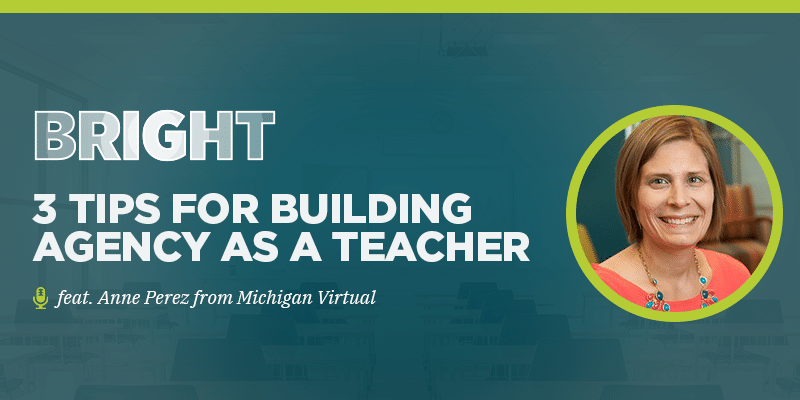Or listen on Apple, Spotify, Google, or another platform. Alternatively, you can read along with the transcript.
On a beautiful October afternoon in 2018, English teacher Anne Perez got an iced coffee that changed her life.
OK, so perhaps that’s a tad melodramatic, but it makes sense when you hear her tell the story.
It was a moment of epiphany. The kind of learning moment that educators love to cultivate for their students.
Anne was “supposed” to be grading the stack of Honors English papers she’d just collected. Her husband was out of town, and she’d just finished a busy day of teaching, making dinner, and shuffling her children to sports practices.
It was the perfect day to be outside, so Anne decided to take her youngest son, Charles, to the park. While on the way there, she decided to treat herself to an iced coffee.
Anne had the best intentions to get some grading done. But upon sitting on a park bench with the iced coffee in hand, she realized that what she needed most at that moment was to watch her son and enjoy the sunshine.
The next day, of course, her students started asking, “Did you get those papers graded, Mrs. Perez?”
She decided to be honest with them. She told them the story about Charles and the park and the iced coffee and the sunshine.
From the side of the classroom, a student shouted, “You just live your best life, Mrs. Perez! You get that iced coffee!”
At first, Anne just laughed, but then enter the epiphany.
“I recognized what I needed,” she explains. “I articulated that need to my students, and by doing that, I started to see a change in myself and my mindset. More importantly, my students started to see change from me, and I started to see more moments of agency from them.”
After 15 years of teaching English, Anne now works for our Michigan Virtual team as a senior professional learning specialist. She facilitates workshops and other learning experiences for educators so that they, too, can recognize and leverage their agency to address recurring classroom challenges.
In this episode of the BRIGHT podcast, Anne and I chat about:
- How she defines “agency” and why it’s essential for teachers
- The moment she had an epiphany about agency in the classroom
- Her top three tips for building this vital skill as a teacher
Here’s a sneak peek at our conversation:
You can listen to my conversation with Anne using the audio player above or by subscribing to the BRIGHT podcast in your app-of-choice (find us on Apple, Spotify, Google, and more) or by reading along with the transcript.
Of course, we understand that educators are busier than ever. If you don’t have time to listen to Anne’s full episode (which offers the fuller effect of her wisdom, energy, and examples), you can still benefit from a glimpse at her top three tips below.
3 tips for building agency as a teacher
#1. Build in time for reflection
Anne’s first tip is to build in time for reflection. She acknowledges that this can be really difficult when you’re already feeling overwhelmed.
The problem is, of course, that if you don’t step back to look at the bigger picture, it’s nearly impossible to see what is and isn’t within your control with clarity.
The first step of building agency is figuring out your needs.
When we’re overwhelmed, our minds tend to automatically troubleshoot our problems using familiar methods. Creative problem-solving becomes difficult when we’re in this mindset.
To make real changes, we first need to pause for long enough to think deeply about our successes, challenges, and needs.
At this stage, it can also be helpful to reflect on your strengths and values. Not sure what your strengths and values are? Check out the CliftonStrengths assessment or the VIA character strengths survey as a starting point.
When you know what your strengths and values are, it’s simply easier to see what you want to keep, what you want to change, and what’s within your power to control.
#2. Find your square squad
If reflection is all about communicating your needs to yourself, then step two is about communicating your needs to others.
It’s easy to get caught up in your own head. One effective way to see your situation from another perspective is to find your “square squad.”
This term comes from Brené Brown. “It’s basically four people,” Anne explains. “These are the people with whom you can talk about anything. There’s high trust and no judgment.”
It can even be helpful to have folks in your square squad who are not fellow educators. Anne shares that she found this practice helpful during her year of agency exploration.
“I could tell them about my needs, and they could hear it in a way that was solely for what I was saying,” she says. “They could mirror it back to me.”
Your square squad might have strategies that worked for them in similar situations with a different context. They might have books for you to read or people for you to meet.
But they don’t need to have all the answers for you. It can be super helpful to have them listen to you and be a sounding board as you come up with your own solutions.
Once you have your square squad, you know who you can go to explore the situations you need to build your agency more deeply.
#3. Try to remain open-minded when growth opportunities present themselves
Anne’s third tip is more of a gentle reminder. If someone in your square squad offers you a suggestion, be open-minded and give it a try.
Read the book. Try talking to the person they said might be able to help. Step outside your comfort zone, at least a little bit.
For Anne, this growth opportunity presented itself in the form of a principal who was friends with one of her square squad members. Through talking to this person, it finally clicked for Anne that she was ready to take the next step in her career.
If she hadn’t cultivated a growth mindset and reached out to this person, she might not have ended up making the career leap that led her to where she is today.
All three of these tips work together, she emphasizes, perhaps by necessity.
“It wasn’t until I was doing all three in tandem,” Anne admits, “that I saw real movement toward change and toward a place where I felt like I had more control.”
My favorite quotes from this episode
“When I think of “agency,” I use a very basic definition: When a person has the ability to think for themselves and make a decision that will then shape any experiences or the trajectory that they go on. Essentially, it’s moving forward.”
“When I was in the classroom and challenges surfaced, or too many papers piled up, it would impact my sense of control. Sometimes, I would get lost or set in a certain way of doing things… I just needed to take a step back and ask, ‘What decision can I make that I have some control over? What might improve this or move this forward?’ Right now, I think reestablishing this [agency] for teachers is so important.”
“Part of [agency] is recognizing your needs. When we don’t take a moment to pause and think about these things — our successes, our challenges, and our needs — the brain begins to automatically troubleshoot with, ‘Okay, well, I want to reduce this stressor, so let’s just go about it the way that we always go about it.’ But when you build in a little time for reflection, it can pull you outside of the normal path you might take and allow you to see the trajectory you want to work toward.”
Related resources
- Read: Rebound: A playbook for rebuilding agency, accelerating learning recovery, and rethinking schools by Douglas Fisher, Nancy Frey, Dominique Smith, and John Hattie
- Read: Atomic habits by James Clear
- Read: Strategies for developing and maintaining self-efficacy in teachers
- Read: Design thinking is a challenge to teach — and that’s a good thing
- Read: The pineapple chart method for teacher feedback and collaboration
- Discover: CliftonStrengths assessment
- Discover: VIA character strengths survey
- Reflect: Self-reflection for enhanced performance at work
- Reflect: Agency reflection document for educators
- Learn and explore: Dare to lead hub by Brené Brown
- Learn and earn: Reaching your potential through self-advocacy (2 SCECHs)
- Learn and earn: Take care of yourself: A course in wellbeing and self-care (3 SCECHs)
- Learn and earn: Being a reflective teacher during a pandemic (3 SCECHs)

